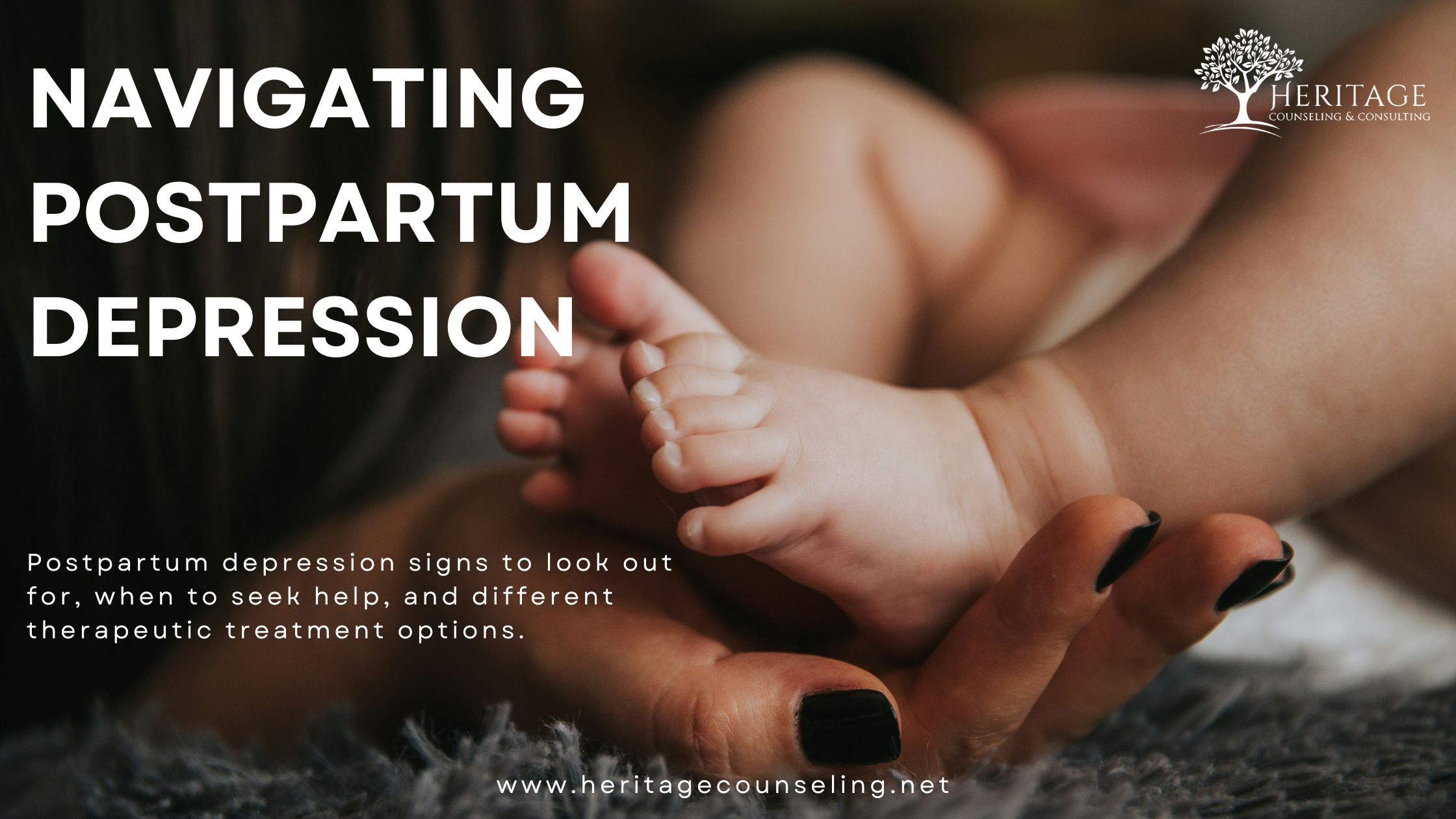Bringing a new life into the world is a momentous occasion, but it also marks the beginning of a challenging journey for many mothers. Acknowledging the prevalence of postpartum depression (PPD) is crucial in ensuring the well-being of both mothers and their infants. This blog aims to shed light on when women should consider seeking therapy for postpartum depression. Recognizing the signs and stages of PPD is the first step toward effective intervention and support. Understanding the nuances of postpartum depression, especially during pregnancy, is vital. We'll explore the signs, symptoms, and the impact on maternal and fetal well-being.
Depression During Pregnancy: Identifying the Signs
Antenatal or prenatal depression is a form of clinical depression that occurs during pregnancy. While pregnancy is often seen as a time of joy and anticipation, some women may experience significant emotional challenges, and antenatal depression is one such manifestation. Understanding this condition is crucial for early identification and support. Let's explore the key aspects of antenatal depression:
Approximately 10-20% of pregnant women experience depression (Pearlstein et al., 2014). It can occur at any point during pregnancy and may persist throughout the gestational period. A few risk factors consist of a history of depression, previous pregnancy loss, lack of social support, relationship issues, financial stress, and hormonal changes. Signs and symptoms to look for during pregnancy consist of:
Persistent feelings of sadness or hopelessness
Changes in sleep patterns
Appetite fluctuations
Intrusive thoughts or fears
Difficulty bonding with the baby
Antenatal depression can have repercussions for both the mother and the developing fetus. Maternal stress and depression may be associated with preterm birth, low birth weight, and developmental issues. Additionally, it can affect the mother's ability to care for herself and the unborn child
Postpartum Depression: Recognizing the Signs After Birth
Postpartum depression (PPD) is a complex and often misunderstood mental health condition that affects some women after giving birth. It is important to recognize that PPD can manifest in various ways, and its impact extends beyond the individual to the well-being of the entire family. In this section, we will provide a comprehensive overview of postpartum depression, shedding light on its prevalence, potential causes, and the emotional challenges that new mothers may face. Navigating through the postpartum period, this section provides insights into the broader context of PPD. Detailing the signs and symptoms that mothers may experience after giving birth, fosters awareness for early detection (O’Hara, 2009).
Recognizing the signs and symptoms of postpartum depression (PPD) after childbirth is essential for early intervention and support. While it's normal for new mothers to experience a range of emotions, persistent and overwhelming feelings of sadness, anxiety, or other changes in mood may indicate the presence of PPD. Here are common signs and symptoms to look out for:
Persistent Sadness or Low Mood
Loss of Interst or Pleasure
Changes in sleep pattern
Fatigue and low energy
Feelings of worthlessness or Guilt
Difficulty making decisions
Appetite changes
Physical symptoms
Irritability or agitation
Withdrawal from activities and social interaction
Difficulty bonding with the body
Intrusive thoughts or fears
Physical symptoms without a clear cause
It's important to note that experiencing one or more of these symptoms does not necessarily mean a woman has postpartum depression. However, if these symptoms persist for an extended period (typically more than two weeks) and interfere with daily functioning, it's crucial to seek professional help.
Signs Indicating the Need for Therapy
Recognizing the signs that indicate the need for therapy is crucial for individuals experiencing postpartum depression (PPD). Seeking professional help can be a transformative step toward managing and overcoming PPD (Silverman et al., 2018). Here are signs that may indicate the need for therapy during postpartum depression:
Persistent Feelings of sadness, hopelessness, or anxiety
Difficulty bonding with the baby
Changes in sleep pattern and appetite
Isolation and withdrawal from loved one
Intrusive thoughts or fears about harming oneself or the baby
Types of Therapy for Postpartum Depression
Several therapeutic approaches can be effective in treating postpartum depression (PPD). The choice of therapy depends on the individual's preferences, the severity of symptoms, and the specific challenges they are facing (Perveen et al, 2013). Here are common types of therapy for postpartum depression:
Cognitive-Behavioral Therapy (CBT) :
Learn to address negative thought patterns and behaviors
Build coping mechanisms for managing stress
Interpersonal Therapy (IPT):
Focus on improving interpersonal relationships
Enhance communication and support systems
Dialectical Behavior Therapy (DBT):
Emphasize mindfulness and emotional regulation
Develop skills to navigate intense emotions
Psychodynamic Therapy
Gain insight into underlying issues that are contributing to depression
Explore the impact of early life experiences on current emotions
Mindfulness-Based Cognitive Therapy (MBCT)
Cultivate awareness of thoughts and emotions
Break the cycle of negative thinking
Group Therapy
Create a supportive community
Share experiences and coping strategies
Neurofeedback Therapy
A non-invasive way of training down mental health such as anxiety and depression
Regulates the nervous system as brain waves are been rewarded
Medication Management
Medication can help when individuals are not responding to alternative treatment options and can provide immediate relief when needed.
Seeking Therapy During Pregnancy
Seeking therapy during pregnancy is a proactive and empowering step that can provide valuable support for expectant mothers. Pregnancy is a time of significant physical and emotional changes, and therapy can help individuals navigate the challenges and promote mental well-being (Werner et al., 2016). Seeking therapy during pregnancy is an investment in one’s mental and physical health. Here are the considerations and benefits of seeking therapy during pregnancy:
Breaking the stigma around seeking help during pregnancy by acknowledging and addressing mental concerns early enough to implement healthy coping skills
Seeking help early can be beneficial in case of emergency mental health issues as well as having a positive impact on the mother and the baby.
Open communication with healthcare workers provides a safe and welcoming environment where one feels they can be honest and can have medical professionals who are in their corner.
Seeking Therapy Postpartum
Seeking therapy postpartum is a proactive and valuable step for mothers who may be experiencing the challenges associated with the post-birth period. Postpartum therapy can provide essential support, coping strategies, and a safe space for mothers to navigate the emotional and psychological adjustments that come with motherhood. Society places a massive amount of pressure on new mothers and it can be challenging to know how to handle this and truth be told, one should never have to handle this on their own. As a new mom, it can be difficult to provide ourselves self-compassion when we feel we are giving all we have to the baby, when in fact it is important we show self-compassion to ourselves and in this seek help when needed. Therapy can be a magnificent tool as it can promote a healthy transition to motherhood and provide tools throughout the journey.
Conclusion
As we embark on this journey together, let's foster a supportive environment that enables mothers to navigate the challenges of postpartum depression with resilience and strength. It is important to pay attention to how we feel looking at our moods such as changes in sadness, appetite fluctuations, Isolation, etc. One’s mental health can be a powerful tool throughout life and when prioritized one will see changes in all various areas of their life. Remember, seeking therapy is a powerful and proactive step towards nurturing both the mind and the precious new life that has entered the world. I want to encourage you to take a leap of faith and call Heritage Counseling at 214-363-2345 for more information about therapy for postpartum depression.
Sources:
https://www.ncbi.nlm.nih.gov/pmc/articles/PMC4308451/
https://www.ncbi.nlm.nih.gov/pmc/articles/PMC3918890/?GCLID=null
https://www.ncbi.nlm.nih.gov/pmc/articles/PMC5462547/

